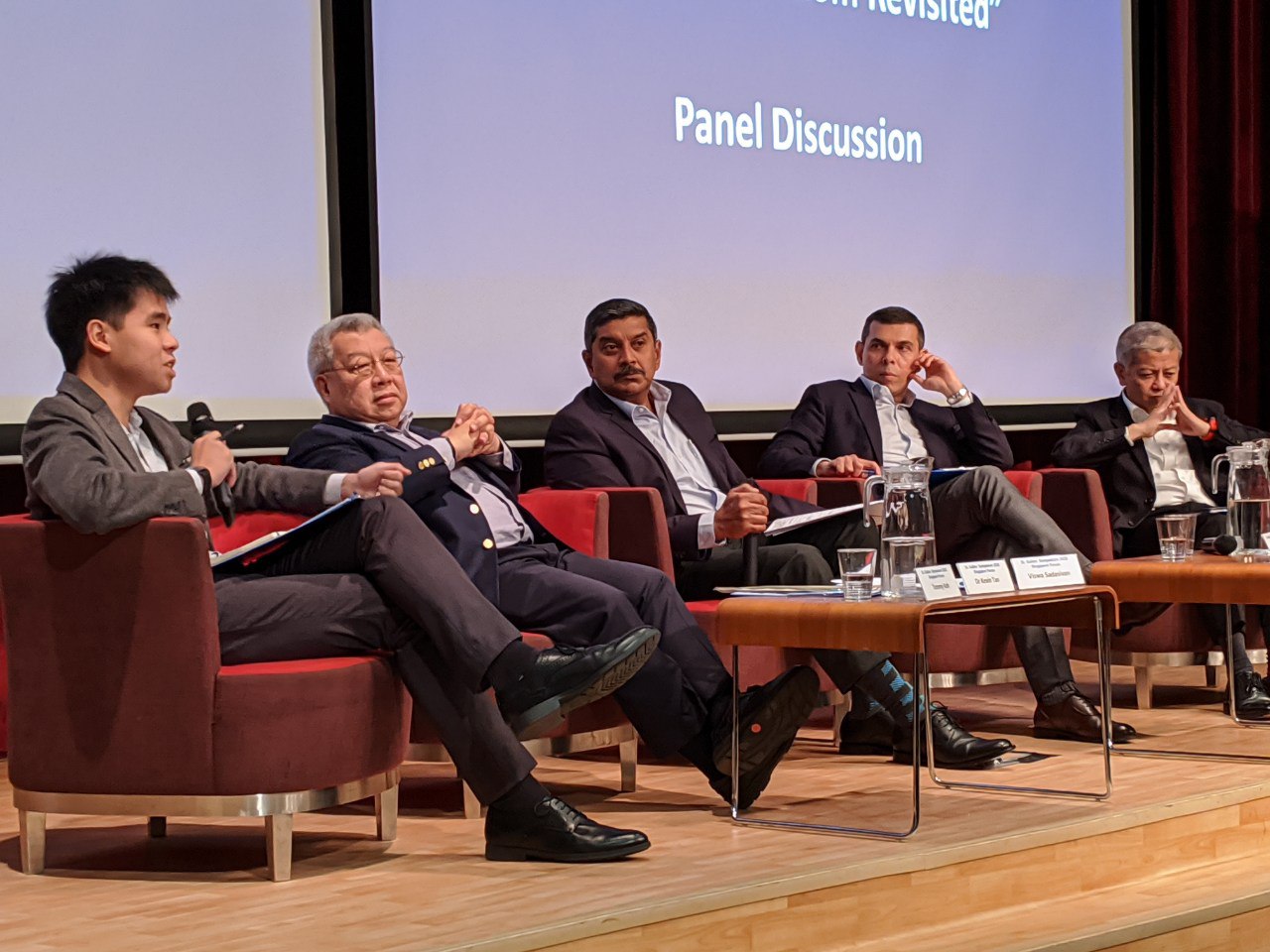Freedom a 'double-edged' knife that needs constant revisiting: St Gallen forum in Singapore
Sign up now: Get ST's newsletters delivered to your inbox

(From left) Mr Tommy Koh, who was the St Gallen Leader of Tomorrow for 2018 and 2019; Professor Kevin Y. L. Tan, adjunct professor at NUS' law faculty; Mr Viswa Sadasivan, moderator and former Nominated MP; Mr Warren Fernandez, The Straits Times editor; and Professor Danny Quah, dean of the Lee Kuan Yew School of Public Policy; during a panel discussion at the 5th St Gallen Symposium Singapore Forum 2020.
ST PHOTO: TEE ZHUO
SINGAPORE - If a personal mobility device (PMD) rider zooms by on an empty footpath, he is definitely breaking a rule but is he actually curtailing anyone's freedom to walk?
A moral conundrum for sure, but one that a panellist at the 5th St Gallen Symposium Singapore Forum 2020 felt could be handled simply: A person could exercise tolerance and not immediately report the man to the authorities.
The example is timely given Singapore's hotly debated PMD footpath ban, but it also drives home a central theme of Saturday's (Jan 18) panel discussion on freedom: While seemingly abstract and absolute, the context and conditions within which freedom operates are something people need to grapple with daily.
Four panellists applied different notions of freedom to a variety of issues and contexts, from fake news in Singapore, to the protests in Hong Kong and to the global climate change crisis.
Moderator and former Nominated MP Viswa Sadasivan kicked off the discussion with the evocative analogy of freedom as a very sharp knife without a handle, carrying the risk of cutting oneself if used incautiously.
It was in considering this analogy that panellist Tommy Koh - not the veteran diplomat of the same name- brought up the PMD example and tolerance.
"How we approach situations where (different) freedoms collide matter... In picking up that knife, perhaps the glove that we need to put on is the glove of tolerance," said Mr Koh, who was the St Gallen Leader of Tomorrow for 2018 and 2019 and is now completing national service.
The analogy, however, presumes conditions of sufficient stability and prosperity such that the individual can wield the knife in the first place, said Professor Danny Quah, dean of the Lee Kuan Yew School of Public Policy.
"The great paradox in freedom today is how so much of the world has benefited from institutions that have given them economic prosperity, and (yet) are willing to throw them away," said Prof Quah, who is also Li Ka Shing Professor in Economics.
Continuing the analogy, fellow panellist and The Straits Times editor Warren Fernandez said that knowing when not to wield the knife was just as important as knowing when to wield it. He cited the Charlie Hebdo shooting in 2015, where 12 people were killed at the magazine's Paris office over offensive cartoons of the Prophet Muhammad.
He said that the ST knew that it would never have run such cartoons given Singapore's multicultural context.
"We recognise the responsibility we have in wielding that power, not to upset the context in which we have been able to enjoy that freedom," said Mr Fernandez, who is also editor-in-chief of Singapore Press Holdings' English/Malay/Tamil Media Group.
Audience members at the forum held at the National University of Singapore University Town asked a range of questions, including whether different freedoms can coexist equally and how to negotiate different cultural views on rights.
Former MP Zainul Abidin Rasheed, one of about 360 attendees, asked the panellists to consider whether Singapore has done well in revisiting the idea of freedom, especially in terms of the Government's role.
Professor Kevin Y.L. Tan, adjunct professor at NUS law faculty and the event's keynote speaker, said Singapore has become increasingly reactive "rather than looking at the whole picture".
"There is a piecemeal, knee-jerk reaction by the state to issues which involve freedoms," said Prof Tan, who is also visiting professor at the S. Rajaratnam School of International Studies.
Citing the example of PMDs again, he said the Government was silent on regulation until a parliamentary question was asked, indicating poor planning.
Another example was the Protection from Online Falsehoods and Manipulation Act (Pofma) passed last year, which Prof Tan said was an example where the state and security prevailed over individual freedoms, and an area which should be revisited.
But revisiting freedoms is an endless process, said Mr Fernandez. He traced how the balance between rights and responsibilities, and individuals versus the collective has changed since the time of Singapore's first Prime Minister Lee Kuan Yew.
Pofma is an example where the Government has taken on board the views of individuals and shaped them to deal with the larger problem of misinformation and fake news.
"I think we will continue to change with a new set of leaders and electorate. It will have to be a constant revisiting of that agreement we've come to in a society," he said.
The annual St Gallen Symposium is run by the University of St Gallen in Switzerland to promote inter-generational discussions.
Past speakers from Singapore include Senior Ministers Tharman Shanmugaratnam and Teo Chee Hean, and Deputy Prime Minister Heng Swee Keat, who spoke at the event last year.
The symposium's Singapore forum, organised by the National Youth Achievement Award Council, was introduced in 2016 as an event leading up to the main conference in Switzerland with the same theme.


